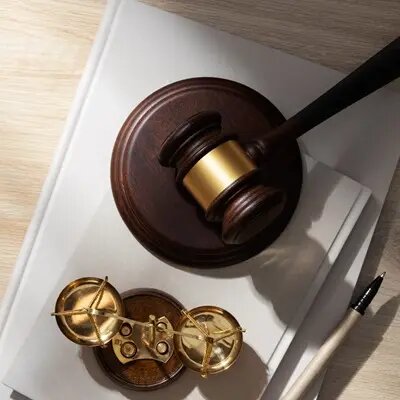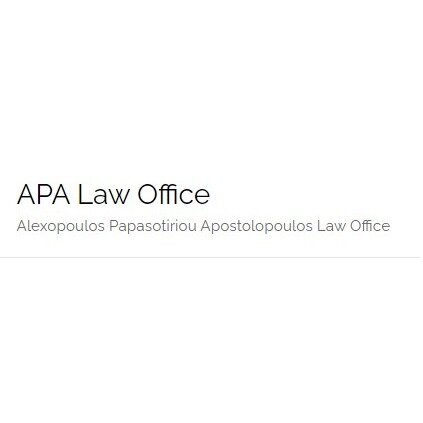Best Water Law Lawyers in Greece
Share your needs with us, get contacted by law firms.
Free. Takes 2 min.
Or refine your search by selecting a city:
List of the best lawyers in Greece
About Water Law in Greece
Water Law in Greece refers to the set of legal regulations, frameworks, and policies that govern the use, protection, management, and distribution of water resources across the country. As a member of the European Union, Greece's water legislation is shaped both by national law and the requirements of EU water directives, such as the Water Framework Directive (2000/60/EC). Greek Water Law addresses issues like water allocation, quality standards, environmental protection, rights and obligations of public and private users, and governmental oversight.
Why You May Need a Lawyer
Legal matters involving water can be highly complex, given the intersecting interests of individuals, businesses, communities, and governments. You may need a lawyer specializing in Water Law in situations such as:
- Disputes over water rights or access, such as conflicts between neighbors or between agricultural users and the state.
- Securing permits or licenses for water abstraction, drilling wells, or using water for industrial or agricultural purposes.
- Allegations or prosecutions related to water contamination, pollution, or violations of environmental standards.
- Property transactions involving rights to water sources or infrastructure, such as wells, springs, or irrigation channels.
- Navigating changes in regulation or compliance with new EU or national water management plans.
- Legal challenges against regulatory decisions, such as denied licenses or imposed restrictions.
Local Laws Overview
Greek Water Law is primarily based on Law 3199/2003, which implements EU directives on water policy. Key aspects of local law include:
- Public Ownership: All surface water (rivers, lakes, streams) and groundwater are considered public property. Their use is regulated and subject to licenses from competent authorities.
- Permits and Licensing: Abstraction of water, the construction of wells, and water usage for agriculture, industry, or domestic supply often require official permits. Unauthorized usage is prohibited and sanctioned.
- Quality and Pollution Control: There are strict standards for water quality and measures to prevent pollution. Discharging waste or contaminants into water sources is tightly regulated.
- Environmental Protection: Water Law integrates environmental considerations, aiming to achieve good ecological status for all water bodies and safeguard aquatic ecosystems.
- Integrated Water Resources Management: Greece is divided into River Basin Districts, each with its own management plan that sets priorities for sustainable use and protection.
- Public Participation: Stakeholders and the general public are entitled to participate in the planning and decision-making process regarding water resources management.
Frequently Asked Questions
What is considered a water right in Greece?
Water rights refer to the legal permission to use water from a specific source for certain purposes, such as irrigation, industrial processes, or household supply. All water resources are public, so private rights only exist through properly granted licenses.
Do I need a permit to drill a well on my property?
Yes, drilling a well requires a permit from the relevant regional authority, regardless of whether it is for personal, agricultural, or commercial use. Unauthorized drilling can result in significant fines.
What are the main laws regulating water use in Greece?
The primary law is Law 3199/2003 on the Protection and Management of Water, which incorporates EU water policies. Additional laws and ministerial decisions regulate specific aspects such as pollution control, irrigation, and public health.
How are water disputes typically resolved?
Water disputes may be resolved through administrative procedures, mediation, or, if necessary, through the civil courts. A specialized lawyer can assess which route is most appropriate for your situation.
Is untreated wastewater discharge allowed in Greece?
Discharging untreated wastewater into natural water bodies is generally prohibited. There are strict regulations and penalties for violations, aiming to protect water quality and the environment.
Can I use river water for irrigation on my land?
You may use river water for irrigation only if you obtain the necessary license from the competent water authority and comply with any stipulated terms and conditions related to environmental protection and water conservation.
What happens if water regulations change after I receive a permit?
If regulations change, existing license holders may be required to comply with the new requirements. Sometimes, permits may be modified, restricted, or, in rare cases, revoked, especially if there is a public interest or environmental concern.
Are there restrictions on water use during droughts?
Yes, authorities may impose temporary water use restrictions during periods of drought to prioritize essential public needs and environmental protection. Breaching these restrictions can result in fines or other penalties.
Who manages water resources at the local level?
Water management at the local level is generally overseen by Decentralized Administrations, Regional Government Departments, and Municipalities, in coordination with the Special Secretariat for Water under the Ministry of Environment and Energy.
Can businesses acquire exclusive rights over water sources?
No, since all water resources are public, exclusive rights are not granted. Businesses can only obtain time-limited licenses to use water for specified purposes along with obligations to comply with relevant laws and plans.
Additional Resources
If you need more information or specialized guidance, consider the following resources:
- Ministry of Environment and Energy - Special Secretariat for Water
- Decentralized Administrations (Water Directorates) in your region
- Local regional and municipal authorities responsible for water management
- Hellenic Ombudsman for environmental and water-related complaints
- Greek Bar Association for referrals to lawyers specializing in environmental and water law
- Civil society and environmental organizations advocating for water rights and protection in Greece
Next Steps
If you believe you need legal assistance regarding Water Law in Greece, follow these steps:
- Gather all relevant documents, such as permits, land ownership titles, correspondence with authorities, and evidence related to your case.
- Identify the specific issue, whether it is a dispute, permit application, compliance question, or regulatory matter.
- Contact the appropriate authority or body for initial guidance, such as your regional water directorate or environmental office.
- Consult a qualified lawyer with expertise in Water Law to review your case and advise you on your rights, obligations, and legal options.
- Consider whether informal resolution or mediation is possible before moving toward litigation, which can be costly and time consuming.
- Act promptly, as many water law matters have strict deadlines for appeals or responses to administrative decisions.
Taking informed legal action ensures the protection of your interests and the sustainable management of Greece's valuable water resources.
Lawzana helps you find the best lawyers and law firms in Greece through a curated and pre-screened list of qualified legal professionals. Our platform offers rankings and detailed profiles of attorneys and law firms, allowing you to compare based on practice areas, including Water Law, experience, and client feedback.
Each profile includes a description of the firm's areas of practice, client reviews, team members and partners, year of establishment, spoken languages, office locations, contact information, social media presence, and any published articles or resources. Most firms on our platform speak English and are experienced in both local and international legal matters.
Get a quote from top-rated law firms in Greece — quickly, securely, and without unnecessary hassle.
Disclaimer:
The information provided on this page is for general informational purposes only and does not constitute legal advice. While we strive to ensure the accuracy and relevance of the content, legal information may change over time, and interpretations of the law can vary. You should always consult with a qualified legal professional for advice specific to your situation.
We disclaim all liability for actions taken or not taken based on the content of this page. If you believe any information is incorrect or outdated, please contact us, and we will review and update it where appropriate.
Browse water law law firms by city in Greece
Refine your search by selecting a city.

















